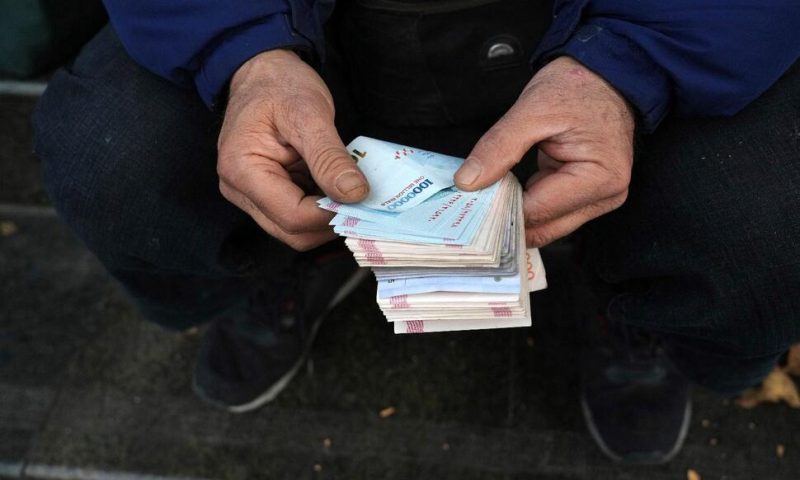Iran’s currency fell to a record low on Sunday, plunging to 613,500 to the dollar, as its people celebrated the Persian New Year
TEHRAN, Iran — Iran’s currency fell to a record low on Sunday, plunging to 613,500 to the dollar, as its people celebrated the Persian New Year.
On Sunday, people were trying to exchange rials for foreign currency at Tehran’s main hub of exchange shops in Ferdowsi Street, but most were closed due to the Nowruz holidays, which are run from March 20 to April 2.
Mohsen, a 32-year-old employee at one of the exchange shops, said the holiday was contributing to the low prices, “The price is not real, the demand for purchasing dollars is very high, but there are just a few exchange shops open.” He and other Iranians spoke on condition their last names not be used, because of potential repercussions for speaking to foreign media about the country’s economic struggles.
The two-week holiday is an opportunity to travel abroad, driving demand for U.S. dollars and Euros.
Mojtaba, a 49-year-old father, was shocked: “The rial fell 5% compared to the last six days, while the whole country is on vacation!”
Niloufar, 28-year-old wife and her husband Behzad, 30, said that they’d booked a weeklong tour of Turkey at a discount rate, but were now looking at spending as much as full-price tour.
The exchange rate strongly affects other markets, including housing and rentals.
The price was 590,000 to the dollar on March 18, the last workday before the holiday.
Many Iranians have seen their life savings evaporate as the local currency has depreciated. Today, it’s worth about one-twentieth as much as it was in 2015, when Iran signed a nuclear accord with world powers.
Since then, it’s fallen from 32,000 rials to the dollar to the hundreds of thousands. In February 2023, it briefly reached a nadir of 600,000 reals to the dollar, and since then has not risen above 439,000.
The government’s Statistics Center put the country’s inflation rate for Feb. 2024 at 42.5%, while Central Bank said it was more than 46%. There is no explanation for the discrepancy.
Iran’s relations with the west have been at exceptional lows since then-U.S. President Donald Trump abandoned a deal that called for the country to end its nuclear program in return for access to frozen funds and other benefits. President Joe Biden said he was willing to re-enter a nuclear deal with Iran, but formal talks to try to find a roadmap to restart the deal collapsed in August 2022. In the meantime, tensions in the Middle East have increased significantly, making nuclear diplomacy with Iran more complicated. Iran has further angered Western countries by supplying armed drones to Russia that have been used in its invasion of Ukraine.
Dire economic conditions have contributed to widespread anger at the government in the past, but have also forced many Iranians to focus on putting food on the table rather than engaging in high-risk political activism amid a fierce crackdown on dissent.
The rial’s record low came less than a month after a parliamentary election that saw the lowest turnout since the 1979 Islamic Revolution, whose results were dominated by hard-line politicians.
Hard-liners have controlled the parliament for the past two decades — with chants of “Death to America” often heard during its sessions.

